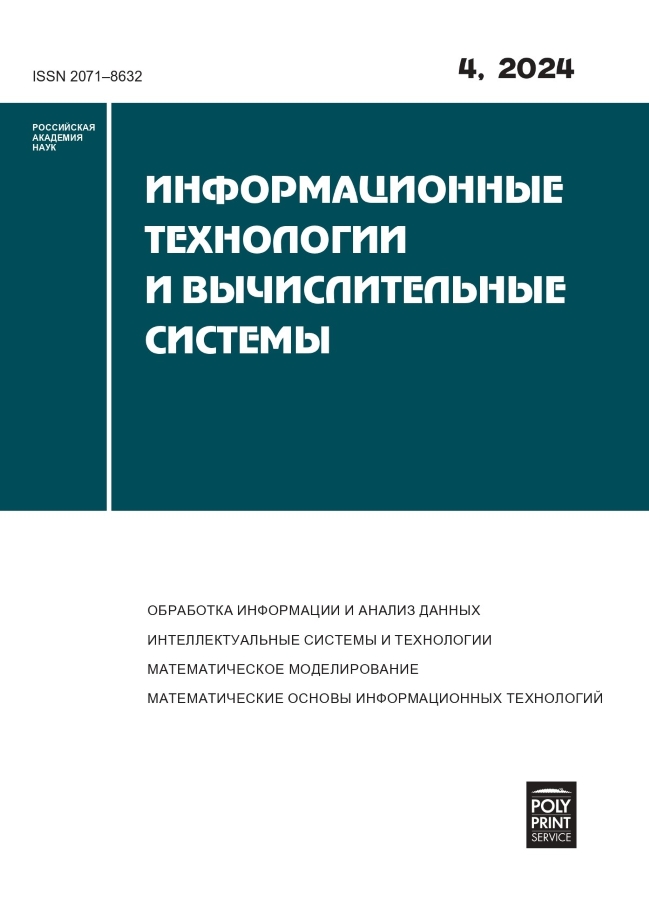Ensuring the long-term preservation of a legally significant electronic document
- Authors: Solovyev A.V.1
-
Affiliations:
- Federal Research Center “Computer Science and Control” of Russian Academy of Sciences
- Issue: No 2 (2023)
- Pages: 48-59
- Section: Information processing and data analysis
- URL: https://journals.rcsi.science/2071-8632/article/view/286531
- DOI: https://doi.org/10.14357/20718632230205
- ID: 286531
Cite item
Abstract
The article deals with the problem of ensuring the long-term preservation of legally significant electronic documents. A review of the problem and existing options for its solution is made, the problem of ensuring the long-term preservation of legally significant electronic documents is formalized as an optimal control problem under parametric disturbances. Document safety indicators and mathematical models for evaluating safety indicators are proposed. The result of the study are algorithms that allow, being implemented in the form of software and hardware, to control and organize long-term preservation. Examples of the practical implementation of the proposed approaches within the framework of large information systems are given. The advantage of the proposed algorithms and approaches is that their implementation will make it possible to comprehensively solve the important scientific and technical problem of organizing the long-term preservation of legally significant electronic documents. At the end of the article, further prospects for research aimed at solving the problem of long-term preservation of big data and systems built using distributed ledger technologies are identified.
About the authors
A. V. Solovyev
Federal Research Center “Computer Science and Control” of Russian Academy of Sciences
Author for correspondence.
Email: soloviev@isa.ru
Chief Researcher, Doctor of Technical Sciences
Russian Federation, MoscowReferences
- The Government of the Russian Federation. 2017. PROGRAM “Digital Economy of the Russian Federation” approved by the order of at July 28, 2017. № 1632-r: 88.
- Ryskov O.I. 2005. “On the main activities of foreign archival bodies in the field of research and regulatory work with electronic documentation”. Sekretarskoye delo. № 3: 76.
- Afanasyeva L.P. 2005. “Automated Archive Technologies”. Federal Agency for Education. State Educational Institution of Higher Professional Education Russian State University for the Humanities: 114.
- Ryskov O.I. 2004. “The main activities of the national archives of the United States and the United Kingdom of Great Britain and Northern Ireland in the field of management of electronic documents of government agencies”. Otechestvenniye Arhivy № 3.
- US National Archives Blog. 2019. http://blogs.archives.gov/records-express/2013/11/01/opportunity-for-comment-transfer-guidance-bulletin/
- U.S. National Archives and Records Administration. 2017 a. Universal Electronic Records Management (ERM) Requirements, https://www.archives.gov/records-mgmt/policy/universalermrequirements
- Miller J. n.d. “NARA to suspend development of ERA starting in 2012” FederalNewsRadio, http://www.federalnewsradio.com/?sid=2204570&nid=35
- Lipowicz A. n. d. “NARA officials defend searchability of electronic archive” Federal Computer Week, http://fcw.com/articles/2011/11/01/nara-officials- defending-searchability-of-electronic-archive.aspx
- Carlstrom G. 2017. “Is DoD's new pay system fair?” Federal Times, http://federaltimes.com/index.php?S=3502888
- U.S. National Archives and Records Administration. 2017 b. National Archives Announces a New Model for the Preservation and Accessibility of Presidential Records, https://www.archives.gov/press/press-releases/2017/nr17-54
- U.S. National Archives and Records Administration. 2017 c. Draft National Archives Strategic Plan, https://www.archives.gov/about/plans-reports/strategic-plan/draft-strategic-plan
- Suvorovtseva N.G. 2017. Storage of electronic documents: foreign experience Vestnik kultury I iskusstva. №4(52): 17 – 23.
- UK Open Government Partnership. 2013. National Action Plan 2013 to 2015: 58.
- Office for Official Publications of the European Communities as INSAR Supplement VI. Typical requirements for automated electronic document management systems. Specification MoReq. ISBN 92 894 1290 9.
- Federal Office for Information Security. 2015. Preservation of Evidence of Cryptographically Signed Documents. BSI Technical Guideline TR-03125. Version 1.2: 183.
- Netwerk Digitaal Erfgoed n.d. https://netwerkdigitaalerfgoed.nl/
- VNIIDAD. 2013. Recommendations for the acquisition, accounting and organization of storage of electronic archival documents in the archives of organizations.
- VNIIDAD. 2013. Recommendations for the acquisition, accounting and organization of storage of electronic archival documents in state and municipal archives.
- Emelyanov S. 1967. Automatic control systems with variable structure. Science.
- Emelyanov S., Kostileva N., Matich B. and Milovidov N. 1978. System design automation. Mashinostroyeniye.
- Emelyanov S. 1997. New types of feedback. Science, Fizmatlit.
- Kirillov D.S., Barchukova T.A. 2021. Digital twins as the basis for the digital transformation of industrial enterprises. Actual issues of economics and management: 161-164.
- Rakhmanov M.L., Shishkin A.V. 2021. Modern digital technologies and digital twin. Kachestvo I zhizn. 2(30): 57-59.
- Grigoriev O.G. at al. 2021. TITANIS: A Tool for Intelligent Text Analysis in Social Media. Artificial Intelligence. RCAI 2021. Lecture Notes in Computer Science. Springer, Cham. 12948: 232-247. DOI: https://doi.org/10.1007/978-3-030-86855-0_16.
- Akimova G., Solovyev A. and Tarkhanov, I. 2018. Reliability Assessment Method for Geographically Distributed Information Systems. The IEEE 12th International Conference on Application of Information and Communication Technologies: AICT, 188-191, 2018, Almaty, Kazakhstan. https://doi.org/10.1109/ICAICT.2018.8747055.
Supplementary files










